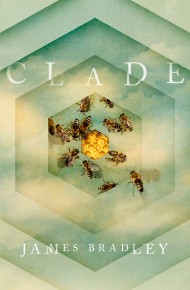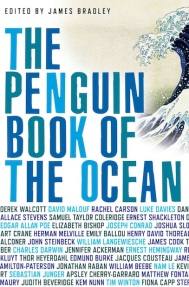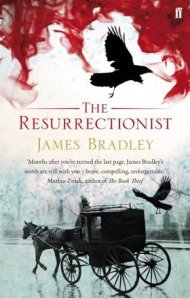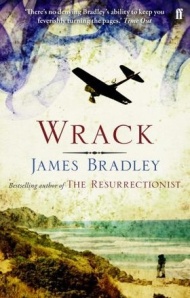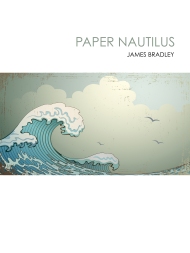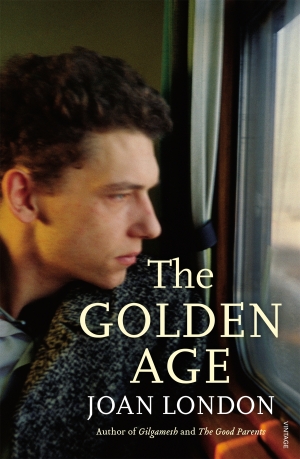 I’d hoped to get this up last Friday, but I ended up holding off because The Weekend Australian’s Best Books feature didn’t run until Saturday and I didn’t want to preempt my contribution to it. If you’ve got a few minutes I strongly suggest you take the time to check that list out, since it’s crammed with great stuff. You might also want to check out the lists in The Sydney Morning Herald and The Age, as well as the excellent Books of the Year feature in Australian Book Review (which I also contributed
I’d hoped to get this up last Friday, but I ended up holding off because The Weekend Australian’s Best Books feature didn’t run until Saturday and I didn’t want to preempt my contribution to it. If you’ve got a few minutes I strongly suggest you take the time to check that list out, since it’s crammed with great stuff. You might also want to check out the lists in The Sydney Morning Herald and The Age, as well as the excellent Books of the Year feature in Australian Book Review (which I also contributed to but isn’t online and is available for the price of a couple of cups of coffee).
As I said in the Oz and ABR, two of the books that stood out for me this year were Ceridwen Dovey’s wonderful suite of short stories, Only The Animals and Joan London’s luminous new novel, The Golden Age. I suspect both sound like slightly odd propositions at first blush – the Dovey is a series of stories about animals whose lives cross over with literary figures such as Tolstoy and Kerouac and Lawson, and the London is about two teenagers in a polio hospital in the 1950s – but they’re both fantastic books, and I’d be very surprised if the London wasn’t all over award shortlists here and overseas in 2015.
Staying with Australian books for a moment, there were three others I enjoyed enormously. The first is Chris Flynn’s The Glass Kingdom. I loved Flynn’s debut, Tiger in Eden, but the often very funny The Glass Kingdom shows Flynn stretching himself imaginatively and technically as he interrogates the various ways men perform masculinity. I was also very impressed by Fiona McFarlane’s tautly written debut, The Night Guest, and the fabulous P.M. Newton’s gritty and brutally unsentimental take on Sydney and crime, Beams Falling.
I also loved two books I’ve already written about but hope to write something longer about soon, David Mitchell’s The Bone Clocks and Michel Faber’s The Book of Strange New Things. I know I’m not alone in being deeply impressed by the Faber, which is both very strange and deeply affecting, but I was also very moved by the Mitchell, which seemed to be deeply and productively engaged with a series of questions about time and loss.
 Moving further afield I also completely adored Ali Smith’s smart, sexy and very moving How to be both, Jenny Offil’s wonderfully fragmented and very witty Dept. of Speculation, and Will Eaves’ marvellous The Absent Therapist, and while half the stories in Lorrie Moore’s Bark had already been published in Faber’s Collected Stories a few years ago, even four new stories by Moore are something to celebrate. Something similar is true of Hilary Mantel’s The Assassination of Margaret Thatcher, almost all of which I’d read elsewhere (and sometimes as non-fiction, which gives the book an even more unsettling frisson) but gathered together the pieces form a powerful and troubling whole. And Margaret Atwood’s Stone Mattress is exactly as smart, funny and wicked as you’d expect, and I can’t recommend it enough.
Moving further afield I also completely adored Ali Smith’s smart, sexy and very moving How to be both, Jenny Offil’s wonderfully fragmented and very witty Dept. of Speculation, and Will Eaves’ marvellous The Absent Therapist, and while half the stories in Lorrie Moore’s Bark had already been published in Faber’s Collected Stories a few years ago, even four new stories by Moore are something to celebrate. Something similar is true of Hilary Mantel’s The Assassination of Margaret Thatcher, almost all of which I’d read elsewhere (and sometimes as non-fiction, which gives the book an even more unsettling frisson) but gathered together the pieces form a powerful and troubling whole. And Margaret Atwood’s Stone Mattress is exactly as smart, funny and wicked as you’d expect, and I can’t recommend it enough.
Whether Richard Ford’s new Frank Bascombe book, Let Me Be Frank With You, is a novel or four short stories is an interesting question, but either way it sees Ford back on top form as he depicts the now retired Bascombe not quite adrift in the aftermath of Hurricane Sandy. Next to Ford Colm Toíbín’s writing can seem deliberately unshowy, but his new one, Nora Webster’s portrait of a woman rebuilding her life after the death of her husband offers a reminder of just how good he is. And while it didn’t make the Booker shortlist Richard Powers’ new novel, Orfeo sees Powers interweaving classical music and biology and terrorism in typically brilliant fashion (just quietly, if I could write a novel like Orfeo I’d die happy).
As I mentioned the other day you can catch me, Jonathan Strahan and Gary K. Wolfe chatting about our favourite science fiction and fantasy books on the Coode Street Podcast’s Year in Review special, but as I say there, I was enormously impressed by William Gibson’s new novel, The Peripheral, which is both brilliantly written and grounded in a fully lived social reality in a way his last couple of books haven’t been, and Adam Roberts’ darkly witty, deeply literate and very unsettling riff on talking animals, Bête. I also adored the second part of Sean Williams’ Twinmaker trilogy, Crashland (which has one of the most jaw-dropping endings I’ve read in ages), Simon Ings’ creepily visceral exploration of virtuality, Wolves, and although I think it’s an almost wilfully unlikable book, I was deeply impressed by Peter Watts’ chilly follow-up to the terrifying Blindsight, Echopraxia. And while I didn’t think Ann Leckie’s sequel to last year’s Ancillary Justice, Ancillary Sword was as successful at a narrative level as its predecessor it was no less thoughtful and uncompromising in its depiction of the nature of power.
Of the debut science fiction novels I read this year the one I loved the most was Monica Byrne’s jagged and sensual The Girl in the Road. And while I’m not sure whether it’s really a genre novel at all, I hugely admired Mountain Goats’ frontman John Darnielle’s awkward and deeply distressing study of trauma and the possibilities of the imagination, Wolf in White Van.
And finally, turning to fantasy, two novels stood head and shoulders above everything else I read. The first was Garth Nix’s wonderful new Old Kingdom novel, Clariel, a book that comes at the world of the Old Kingdom from a new angle, and which doesn’t just provide a reminder of just how wonderful that world is, but of how rich and magical and funny Nix is when he’s working at full throttle. And the second was the emotionally expansive and deeply satisfying conclusion Lev Grossman’s fabulous Magicians trilogy, The Magician’s Land.
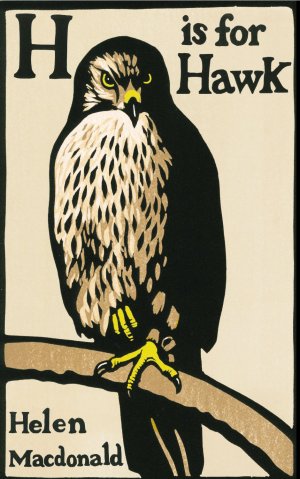 On the non-fiction front I loved Iain McCalman’s passionate and thrilling history of the Great Barrier Reef, Reef, and slightly closer to home, Ian Hoskins’ wonderful history of the New South Wales coastline, Coast. I also very much enjoyed James Nestor’s descent into the world of freediving and fringe science, Deep (a book I want to write something more about soon) and . But the two non-fiction books I loved the most this year were Helen MacDonald’s sometimes strained, sometimes eerily beautiful H is for Hawk (and interestingly the third book engaged by T.H. White’s legacy I’ve read in the last couple of years) and Sophie Cunningham’s tense, terrifying and frighteningly prescient study of Cyclone Tracy and its aftermath, Warning.
On the non-fiction front I loved Iain McCalman’s passionate and thrilling history of the Great Barrier Reef, Reef, and slightly closer to home, Ian Hoskins’ wonderful history of the New South Wales coastline, Coast. I also very much enjoyed James Nestor’s descent into the world of freediving and fringe science, Deep (a book I want to write something more about soon) and . But the two non-fiction books I loved the most this year were Helen MacDonald’s sometimes strained, sometimes eerily beautiful H is for Hawk (and interestingly the third book engaged by T.H. White’s legacy I’ve read in the last couple of years) and Sophie Cunningham’s tense, terrifying and frighteningly prescient study of Cyclone Tracy and its aftermath, Warning.
Of the graphic things I read I loved a number of the quirkier titles Marvel has been producing, in particular Warren Ellis, Declan Shalvey and Jordie Bellaire’s brutal and brooding Moon Knight, Mark Waid and Chris Samnee’s Daredevil, Matt Fraction and David Aja’s Hawkeye, G. Willow Wilson’s joyous Ms Marvel and Charles Soule’s now-sadly cancelled She-Hulk, but I think the thing I enjoyed most was Emily Carroll’s fabulously creepy collection of shorts, Through the Woods, a book that brilliantly marries a finely tuned affection for the pulp comics of the 1950s, an awareness of the cruelty of fairy tales and a wonderfully acute grasp of the darker corners of the human psyche. It’s great stuff.
Of course as always there are a number of things I haven’t got to yet but am looking forward to very much, in particular Marilynne Robinson’s Lila, the third part of Karl Ove Knausgaard’s My Struggle, Boyhood Island, Roz Chast’s Can’t We Talk About Something More Pleasant?, Dave Hutchinson’s Europe in Autumn, Rjurik Davidson’s Unwrapped Sky, Jane Bryony Rawson’s A Wrong Turn at the Office of Unmade Lists, Cixin Liu’s The Three-Body Problem, Hassan Blasim’s The Corpse Exhibition, Rebecca Solnit’s The Faraway Nearby, Angela Slatter’s The Bitterwood Bible and Ben Lerner’s 10:04, a number of which I hope to get read over the break.
On the subject of which I hope the holiday season brings good things to all of you, and the year ahead is full of good things. Peace and goodwill to you all.

Emily Carroll, Through the Woods
 As promised the other day, I thought I’d do a quick roundup of some of the books I enjoyed most this year. Right at the top of my list are two books I loved quite immoderately, Richard Powers’ The Overstory and Michael Ondaatje’s Warlight. The former is just astonishing – a seamless synthesis of science and fiction that manages to make the ecological crisis surrounding us viscerally real – the latter is a book that ranks with Ondaatje’s best work.
As promised the other day, I thought I’d do a quick roundup of some of the books I enjoyed most this year. Right at the top of my list are two books I loved quite immoderately, Richard Powers’ The Overstory and Michael Ondaatje’s Warlight. The former is just astonishing – a seamless synthesis of science and fiction that manages to make the ecological crisis surrounding us viscerally real – the latter is a book that ranks with Ondaatje’s best work. A number of the Australian books I read this year were from last year as well; I particularly admired Michelle de Kretser’s The Life to Come, Ryan O’Neill’s Their Brilliant Careers and Jennifer Down’s wonderful story collection, Pulse Points. Of those published in 2018 I loved Jock Serong’s historical thriller, Preservation, Jennifer Mill’s marvellous Dyschronia and Mark Smith’s sequel to his standout YA debut, The Road to Winter, Wilder Country.
A number of the Australian books I read this year were from last year as well; I particularly admired Michelle de Kretser’s The Life to Come, Ryan O’Neill’s Their Brilliant Careers and Jennifer Down’s wonderful story collection, Pulse Points. Of those published in 2018 I loved Jock Serong’s historical thriller, Preservation, Jennifer Mill’s marvellous Dyschronia and Mark Smith’s sequel to his standout YA debut, The Road to Winter, Wilder Country. And finally, my non-fiction reading was a bit spotty, but a lot of what I did read was terrific, and of that, the absolute highlights were Caspar Henderson’s prismatic A New Map of Wonders, Joy McCann’s wonderfully rich and expansive history of the Southern Ocean, Wild Sea, Nancy Campbell’s The Library of Ice, Phillipa McGuinness’ 2001: The Year That Changed Everything, and two books about sea level rise, Elizabeth Rush’s beautiful Rising and Jeff Goodell’s deeply confronting The Water Will Come.
And finally, my non-fiction reading was a bit spotty, but a lot of what I did read was terrific, and of that, the absolute highlights were Caspar Henderson’s prismatic A New Map of Wonders, Joy McCann’s wonderfully rich and expansive history of the Southern Ocean, Wild Sea, Nancy Campbell’s The Library of Ice, Phillipa McGuinness’ 2001: The Year That Changed Everything, and two books about sea level rise, Elizabeth Rush’s beautiful Rising and Jeff Goodell’s deeply confronting The Water Will Come.
 Just a quick post to say how delighted I am to discover
Just a quick post to say how delighted I am to discover  I’m aware this is a little late in the piece, but I thought I might take a few minutes to pull together a section of the books I’ve enjoyed the most over the past twelve months.
I’m aware this is a little late in the piece, but I thought I might take a few minutes to pull together a section of the books I’ve enjoyed the most over the past twelve months. It seems to have slipped off many people’s radar already, but I loved Kazuo Ishiguro’s deeply strange excursion into post-Arthurian Britain, The Buried Giant, Kevin Barry’s similarly strange and stylistically pyrotechnic portrait of John Lennon lost in rural Ireland in 1978, Beatlebone, and Anne Enright’s marvellous The Green Road (the second chapter of which is worth the price of admission alone). Likewise I very much enjoyed the fourth volume of Karl Ove Knausgaard’s My Struggle, Dancing in the Dark, not just because it’s so funny, but because it’s the book where the series’ fictional and autobiographical elements begin to enfold each other in fascinating ways, and in so doing begin to bring the complexity of Knausgaard’s larger design into focus. And although I’ve come to it late, John Williams’ Stoner is exactly as brilliant as everybody says it is.
It seems to have slipped off many people’s radar already, but I loved Kazuo Ishiguro’s deeply strange excursion into post-Arthurian Britain, The Buried Giant, Kevin Barry’s similarly strange and stylistically pyrotechnic portrait of John Lennon lost in rural Ireland in 1978, Beatlebone, and Anne Enright’s marvellous The Green Road (the second chapter of which is worth the price of admission alone). Likewise I very much enjoyed the fourth volume of Karl Ove Knausgaard’s My Struggle, Dancing in the Dark, not just because it’s so funny, but because it’s the book where the series’ fictional and autobiographical elements begin to enfold each other in fascinating ways, and in so doing begin to bring the complexity of Knausgaard’s larger design into focus. And although I’ve come to it late, John Williams’ Stoner is exactly as brilliant as everybody says it is. Over on the genre side I adored Dave Hutchinson’s smart, politically savvy near-future political thriller,
Over on the genre side I adored Dave Hutchinson’s smart, politically savvy near-future political thriller,  I read fewer Australian books than I should have, but of those I did I very much admired Mireille Juchau’s portrait of an ecologically fraying landscape, The World Without Us, and Tegan Bennett Daylight’s brilliantly observed and exquisitely painful Six Bedrooms, Charlotte Wood’s ferocious
I read fewer Australian books than I should have, but of those I did I very much admired Mireille Juchau’s portrait of an ecologically fraying landscape, The World Without Us, and Tegan Bennett Daylight’s brilliantly observed and exquisitely painful Six Bedrooms, Charlotte Wood’s ferocious  On the more technical side I very much enjoyed Mckenzie Wark’s notes toward a theory for the Anthropocene, Molecular Red (his unpacking of the politics and architectonics of Kim Stanley Robinson’s Mars Trilogy is a must-read for anybody interested in Robinson). And while it needed a much firmer editorial hand (and, I suspect, to be broken up into two different books), Elvis Costello’s memoir, Unfaithful Music and Disappearing Ink is as funny, savage and fascinating about songwriting as you’d expect, and while too long and oddly unreflective in some regards, often surprisingly moving, especially when it comes to Costello’s relationship with his father.
On the more technical side I very much enjoyed Mckenzie Wark’s notes toward a theory for the Anthropocene, Molecular Red (his unpacking of the politics and architectonics of Kim Stanley Robinson’s Mars Trilogy is a must-read for anybody interested in Robinson). And while it needed a much firmer editorial hand (and, I suspect, to be broken up into two different books), Elvis Costello’s memoir, Unfaithful Music and Disappearing Ink is as funny, savage and fascinating about songwriting as you’d expect, and while too long and oddly unreflective in some regards, often surprisingly moving, especially when it comes to Costello’s relationship with his father.
 I’d hoped to get this up last Friday, but I ended up holding off because The Weekend Australian’s Best Books feature didn’t run until Saturday and I didn’t want to preempt my contribution to it. If you’ve got a few minutes I strongly suggest you take the time to
I’d hoped to get this up last Friday, but I ended up holding off because The Weekend Australian’s Best Books feature didn’t run until Saturday and I didn’t want to preempt my contribution to it. If you’ve got a few minutes I strongly suggest you take the time to  Moving further afield I also completely adored Ali Smith’s smart, sexy and very moving How to be both, Jenny Offil’s wonderfully fragmented and very witty Dept. of Speculation, and
Moving further afield I also completely adored Ali Smith’s smart, sexy and very moving How to be both, Jenny Offil’s wonderfully fragmented and very witty Dept. of Speculation, and  On the non-fiction front I loved
On the non-fiction front I loved 


